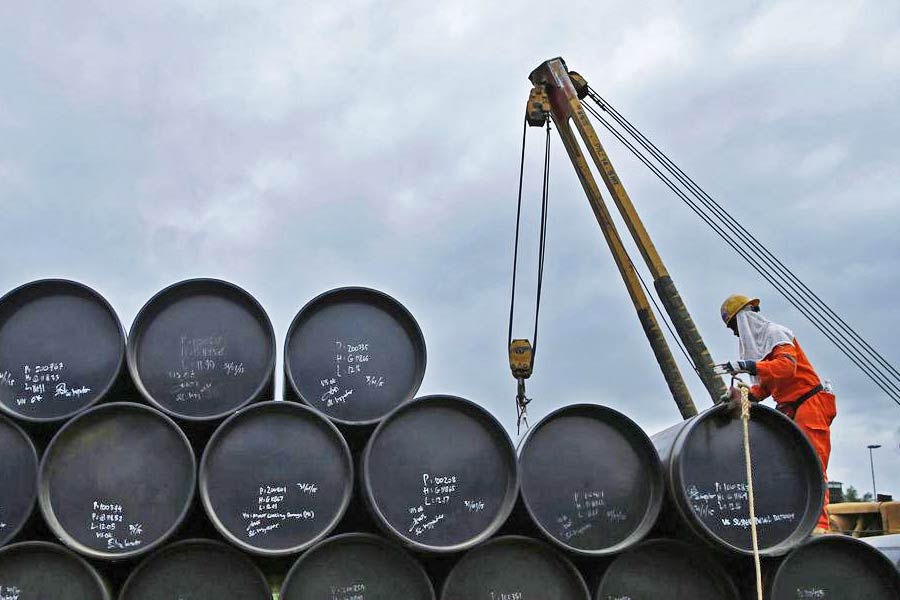Russia earned EUR 93 billion in revenue from fossil fuel exports in the first 100 days of the country’s invasion of Ukraine, despite a fall in export volumes in May. The EU imported 61% of this, worth approximately 57 billion EUR, according to detailed tracking of Russian oil, gas and coal shipments and pipeline exports by the Centre for Research on Energy and Clean Air (CREA).
Revenue from fossil fuel exports is the key enabler of Russia’s military buildup and aggression, providing 40% of federal budget revenue. Recently, Russia’s finance minister highlighted that the country’s earnings from fossil fuel exports will increase substantially this year, and a part of this increase in revenue will be used to fund the “special operation” in Ukraine. Revenues have increased due to high global fuel prices, despite a reduction in the volume of Russia’s exports.
The total volume of fossil fuel exports from Russia fell by 15% in May compared with the time before the invasion, and the EU managed to cut daily imports from Russia by 20% in May, led by Poland, the Baltics and Nordics. The prices paid for Russian oil were 30% below international market prices, as many countries and firms shunned Russian supplies. The reduction in demand and the discounted prices cost Russia approximately 200 million EUR per day in May.
However, the increase in global fossil demand has created a windfall: Russia’s average export prices were on average 60% higher than last year, even if they were discounted from international prices.
“The progress to date is far too slow given Ukraine’s urgent need for support. Much stronger action is needed to cut off the flow of cash to Russia. Globally, we need to speed up the deployment of clean energy to replace fossil fuel imports and ease the high fuel prices which are driving up Russia’s revenues,” said CREA lead analyst Lauri Myllyvirta.
China overtook Germany as the largest importer. China’s imports have inched up while Germany has managed a modest reduction. The largest importers in the first 100 days were China (EUR12.6bln), Germany (EUR12.1bln), Italy (EUR7.8bln), Netherlands (EUR7.8bln), Turkey (EUR6.7bln), Poland (EUR4.4bln), France (EUR4.3bln), India (EUR3.4bln) and South Korea (EUR3.4bln).
“One hundred days of suffering, death and destruction. One hundred days of growing multi-billion EUR revenues for Russian fossil fuels. One hundred days of asking ourselves a simple question: how can the countries of the world say they support Ukraine but at the same time pump even more money into the Russian state budget, thus enabling the continued aggression?” asked Kostiantyn Krynytskyi, Head of Energy Department, NGO Ecoaction. “We want to ensure Ukraine wins this war as soon as possible. A complete and immediate embargo on all Russian oil, gas and coal is the key to peace in Ukraine. We do not want these hundred days of war to become the ‘first’ of many more”.
Poland and the United States made the largest dents in Russia’s revenue, reducing imports in May by EUR 30 million and 20 million per day, respectively, compared with the time before the invasion. Lithuania, Finland and Estonia achieved sharp reductions of more than 50% in percentage terms. The largest reduction took place in pipeline gas imports into Europe, which are down 25% on year.
India, France, China, United Arab Emirates and Saudi Arabia increased imports. India became a significant importer of Russian crude oil, buying 18% of the country’s exports. A significant share of the crude is re-exported as refined oil products, including to Europe. France was the largest buyer of discounted LNG and oil cargoes on the short-term market, which drove up imports.
“The exports of Russian oil to new markets are being enabled by Greek and other European shipping companies. As Russian oil is shipped to more distant markets, more tanker capacity than ever before is needed for the transport. 80% of the tankers carrying Russian oil to India and the Middle East, for example, are European or U.S.-owned. This should be the next focus of EU action,” Myllyvirta said.
Contacts for additional information:
Lauri Myllyvirta, lead analyst at CREA
Phone: +358 50 3625 981
Email: lauri@energyandcleanair.org
Kostiantyn Krynytskyi, Head of Energy Department, Centre of Environmental Initiatives “Ecoaction” / Екодія
Email: kk@ecoact.org.ua


Nothing shows more the fundamentally the evil nature of international energy business than the fact that even though nations with decency and genuine determination to help Ukraine did significantly reduce their energy import from Russia, other nations like India, China, France, Saudi Arabia and UAE made the diamaterically opposite action by increasing their Russian energy import even at higher prices. In fact, uncontrollable US and EU (e.g., Greek) transporting companies also help the global distribution of Russian energy. Putin, a KGB-educated intelligent man, was perfectly aware of this evil side of the global energy business, and thus knew how to counteract the US and EU sanctions and make them essentially ineffective. I still believe that just as Napoleon’s agressions over Europe looked good to him for many years and Hitler’s aggressions looked similarly good to him for two years in WWII, to be fully and completely defeated defeated later, Putin’s war can still look good to him because of his energy importer/transporter fellows’ evil help — but he will be defeated. Unfortunately, new wars and new destructions will come again until the world’s energy system will be renewed to serve all instead of the few.